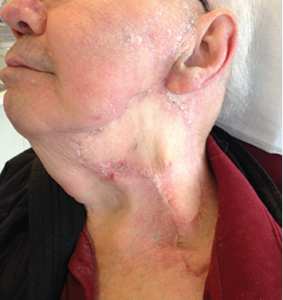
Supraclavicular flap reconstruction for parotid defect
Explore This Issue
March 2018Posterior Maxillary Defects
Samir Khariwala, MD, chief of the division of otolaryngology-head and neck surgery at the University of Minnesota in Minneapolis, said that tumors in the posterior maxillary region, as well as the resulting defects, are often small, and a local or regional flap—such as a facial artery myomucosal (FAMM) flap, a palatal island flap, or submental flap—will often be a reasonable choice.
“When we’re talking about a small posterior maxillary defect, I would really argue to prefer local tissue, basically to minimize unfavorable scarring,” he said. “We want to prevent things like trismus or VPI (velopharyngeal insufficiency), and really free tissue is probably not necessary in some of these small defects, especially if we’re not going to be opening the neck anyway.”
Matthew Hanasono, MD, professor and reconstructive microsurgery fellowship program director at The University of Texas MD Anderson Cancer Center in Houston, pointed to studies showing that patients receiving free flaps for these defects were typically able to be fitted for a conventional dental prosthesis or didn’t want one because they were happy with their results. Dentition is often not a concern (Plast Reconstr Surg. 2013;131:47-60). “Just because you get a free flap doesn’t mean you can’t get teeth,” he said, although larger defects generally require osseointegrated implants.
At most centers, he said, morbidity is low, more often sealing off foods and liquids and avoiding nasal escape during speech, he said. “I think reliability is an advantage certainly over some pedicle flaps, which may have a lower reliability or partial necrosis rate,” he said. “Soft tissue free flaps really are, at least in our practice, the standard of care for posterior maxillary defects.”
Parotid Defects
Daniel Deschler, MD, vice chair of academic affairs at Massachusetts Eye and Ear in Boston, said a pectoralis major flap can be a good option for some patients, even though they can be bulky. “You can debulk these later on,” he said.
Another option is the supraclavicular flap. For one of his patients, who had a recurrent extensive lesion that involved part of the mandible and a wide surface defect, he said he opted against a pectoralis flap—due to concerns about coverage and bulk—and used a supraclavicular flap instead. It folded over a bit on itself, but eventually that folding faded, and in the end was a minimally morbid operation with good coverage.